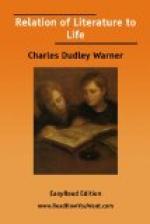At the age of twelve this portion of his education came to an end. The family then moved to Cazenovia in Madison county in Central New York, from which place Warner’s mother had come, and where her immediate relatives then resided. Until he went to college this was his home. There he attended a preparatory school under the direction of the Methodist Episcopal Church, which was styled the Oneida Conference Seminary. It was at this institution that he fitted mainly for college; for to college it had been his father’s dying wish that he should go, and the boy himself did not need the spur of this parting injunction. A college near his home was the excellent one of Hamilton in the not distant town of Clinton in the adjoining county of Oneida. Thither he repaired in 1848, and as he had made the best use of his advantages, he was enabled to enter the sophomore class. He was graduated in 1851.
But while fond of study he had all these years been doing something besides studying. The means of the family were limited, and to secure the education he desired, not only was it necessary to husband the resources he possessed, but to increase them in every possible way. Warner had all the American boy’s willingness to undertake any occupation not in itself discreditable. Hence to him fell a full share of those experiences which have diversified the early years of so many men who have achieved success. He set up type in a printing office; he acted as an assistant in a bookstore; he served as clerk in a post-office. He was thus early brought into direct contact with persons of all classes and conditions of life.
The experience gave to his keenly observant mind an insight into the nature of men which was to be of special service to him in later years. Further, it imparted to him a familiarity with their opinions and hopes and aspirations which enabled him to understand and sympathize with feelings in which he did not always share.
During the years which immediately followed his departure from college, Warner led the somewhat desultory and apparently aimless life of many American graduates whose future depends upon their own exertions and whose choice of a career is mainly determined by circumstances. From the very earliest period of his life he had been fond of reading. It was an inherited taste. The few books he found in his childhood’s home would have been almost swept out of sight in the torrent, largely of trash, which pours now in a steady stream into the humblest household. But the books, though few, were of a high quality; and because they were few they were read much, and their contents became an integral part of his intellectual equipment. Furthermore, these works of the great masters, with which he became familiar, set for him a standard by which to test the value of whatever he read, and saved him even in his earliest years from having his taste impaired and his judgment misled by the vogue of meretricious




